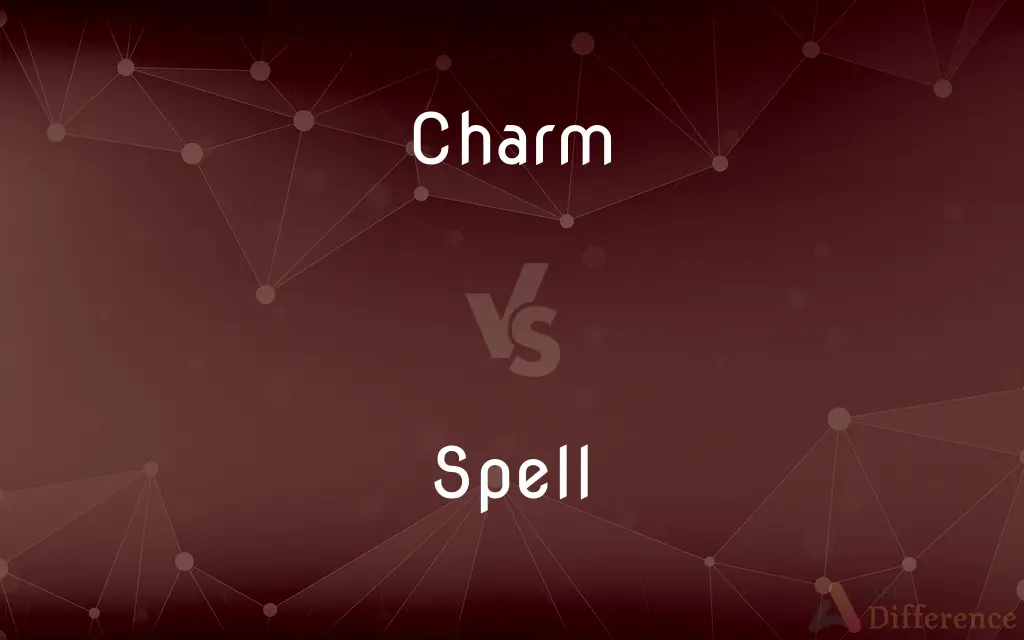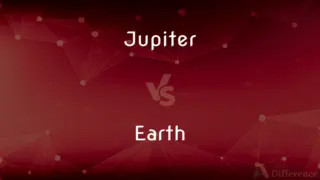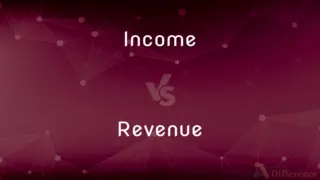Charm vs. Spell — What's the Difference?
By Tayyaba Rehman — Updated on October 29, 2023
A charm is a small object or spell believed to bring good luck or have magical properties, while a spell is a set of words with magical powers.

Difference Between Charm and Spell
Table of Contents
ADVERTISEMENT
Key Differences
A charm often refers to an object that carries sentimental or mystical significance, believed to confer good luck or protection to its holder. A charm can also be an incantation or spell intended to invoke some magical effect on a person or object. The term evokes a sense of whimsy and gentle enchantment. Charms are frequently associated with personal rituals and are considered to harbor benign magic.
A spell, on the other hand, is a verbal formula considered to have magical force. It is typically a series of words that embodies the intention of altering the material world or the psychological state of an individual through supernatural means. Spells are integral components of many cultural rituals and are not confined to positive effects; they can be crafted for a wide range of purposes, including harm.
Charm implies an allure or appeal, often enchanting in a subtle, delightful way. This allure can be personal, as in someone’s demeanor, or attributed to an object, implying that its magic is more innate than invoked. Spells lack this connotation of allure; they are the invocation itself, commanding the magic rather than containing it.
While charms are sometimes seen as passive in their magic, simply needing to be carried or worn, spells require specific actions or recitations to activate their power. The effectiveness of a spell is often tied to the precision with which it is performed, whereas a charm’s power might be considered inherent and constant, needing no particular activation.
In a more abstract sense, charm can also denote the power or quality of giving delight or arousing admiration, a trait that is not typically associated with the more utilitarian and ritualistic nature of spells. Spells are methodical and sometimes complex, requiring certain conditions, ingredients, or timings to be effective.
ADVERTISEMENT
Comparison Chart
Definition
An object or minor magical act for good luck.
A verbal formula to exert magical control.
Connotation
Often positive and protective.
Neutral; depends on intent and context.
Usage in Magic
Passive, carried or worn.
Active, recited or performed.
Purpose
Typically for luck or protection.
Varies widely, from harm to healing.
Cultural Perception
Frequently seen as benign or superstitious.
Often associated with rituals and ceremonies.
Compare with Definitions
Charm
Jewelry piece
She added a new charm to her bracelet.
Spell
Magical ritual
The sorcerer cast a spell to become invisible.
Charm
The power or quality of pleasing or delighting; appeal
An old house with a lot of charm.
Spell
Writing correctly
Please spell your name for the record.
Charm
A quality that pleases or attracts; a delightful characteristic
A mischievous grin was among the child's many charms.
Spell
Captivating effect
Her performance held the audience under a spell.
Charm
A small ornament, such as one worn on a bracelet.
Spell
Recite letters
Children learn to spell before they can construct sentences.
Charm
An item worn for its supposed magical benefit, as in warding off evil; an amulet.
Spell
To name or write in order the letters constituting (a word).
Charm
An action or formula thought to have magical power.
Spell
To constitute the letters of (a word)
These letters spell animal.
Charm
A quantum property of subatomic particles that is conserved in electromagnetic and strong interactions but may not be conserved in weak interactions that cause the decay of particles containing charm quarks.
Spell
To add up to; signify
Their unwise investment could spell financial ruin.
Charm
The quantum number that represents the charm property, equal to the difference between the number of charm quarks and the number of charm antiquarks.
Spell
To name or write in order the letters of a word or words
I've never been able to spell very well.
Charm
To delight or fascinate
The simple elegance of the meal charmed the guests.
Spell
To put (someone) under a spell; bewitch.
Charm
To induce by means of strong personal attractiveness
Charmed the guard into admitting them without invitations.
Spell
To relieve (someone) from work temporarily by taking a turn.
Charm
To cast or seem to cast a spell on; bewitch.
Spell
To allow (someone) to rest a while.
Charm
To be alluring or pleasing.
Spell
To take turns working.
Charm
To function as an amulet or charm.
Spell
(Australian) To rest for a time from an activity.
Charm
To use magic spells.
Spell
A word or formula believed to have magic power.
Charm
An object, act or words believed to have magic power (usually carries a positive connotation).
A charm against evil
It works like a charm.
Spell
A bewitched state or trance
The sorcerer put the prince under a spell.
Charm
The ability to persuade, delight or arouse admiration.
He had great personal charm.
She tried to win him over with her charms.
Spell
A compelling attraction; charm or fascination
The spell of the theater.
Charm
A small trinket on a bracelet or chain, etc., traditionally supposed to confer luck upon the wearer.
She wears a charm bracelet on her wrist.
Spell
A short, indefinite period of time.
Charm
(particle physics) A quantum number of hadrons determined by the number of charm quarks and antiquarks.
Spell
(Informal) A period of weather of a particular kind
A dry spell.
Charm
(finance) A second-order measure of derivative price sensitivity, expressed as the instantaneous rate of change of delta with respect to time.
Spell
One's turn at work.
Charm
The mixed sound of many voices, especially of birds or children.
Spell
A period of work; a shift.
Charm
A flock, group (especially of finches).
Spell
(Australian) A period of rest.
Charm
To seduce, persuade or fascinate someone or something.
He charmed her with his dashing tales of his days as a sailor.
Spell
(Informal) A period of physical or mental disorder or distress
A dizzy spell.
Charm
(transitive) To use a magical charm upon; to subdue, control, or summon by incantation or supernatural influence.
After winning three games while wearing the chain, Dan began to think it had been charmed.
Spell
(Informal) A short distance.
Charm
To protect with, or make invulnerable by, spells, charms, or supernatural influences.
She led a charmed life.
Spell
Words or a formula supposed to have magical powers.
He cast a spell to cure warts.
Charm
To make music upon.
Spell
A magical effect or influence induced by an incantation or formula.
Under a spell
Charm
To subdue or overcome by some secret power, or by that which gives pleasure; to allay; to soothe.
Spell
(obsolete) Speech, discourse.
Charm
A melody; a song.
With charm of earliest birds.
Free liberty to chant our charms at will.
Spell
A shift (of work); (rare) a set of workers responsible for a specific turn of labour.
Charm
A word or combination of words sung or spoken in the practice of magic; a magical combination of words, characters, etc.; an incantation.
My high charms work.
Spell
(informal) A definite period (of work or other activity).
Charm
That which exerts an irresistible power to please and attract; that which fascinates; any alluring quality.
Charms strike the sight, but merit wins the soul.
The charm of beauty's powerful glance.
Spell
(colloquial) An indefinite period of time (usually with a qualifier); by extension, a relatively short distance.
Charm
Anything worn for its supposed efficacy to the wearer in averting ill or securing good fortune.
Spell
A period of rest; time off.
Charm
Any small decorative object worn on the person, as a seal, a key, a silver whistle, or the like. Bunches of charms are often worn at the watch chain.
Spell
A period of illness, or sudden interval of bad spirits, disease etc.
Charm
A property of certain quarks which may take the value of +1, -1 or 0.
Spell
(cricket) An uninterrupted series of alternate overs bowled by a single bowler.
Charm
To make music upon; to tune.
Here we our slender pipes may safely charm.
Spell
(dialectal) A splinter, usually of wood; a spelk.
Charm
To subdue, control, or summon by incantation or supernatural influence; to affect by magic.
No witchcraft charm thee!
Spell
The wooden bat in the game of trap ball, or knurr and spell.
Charm
To subdue or overcome by some secret power, or by that which gives pleasure; to allay; to soothe.
Music the fiercest grief can charm.
Spell
To put under the influence of a spell; to affect by a spell; to bewitch; to fascinate; to charm.
Charm
To attract irresistibly; to delight exceedingly; to enchant; to fascinate.
They, on their mirth and danceIntent, with jocund music charm his ear.
Spell
To read (something) as though letter by letter; to peruse slowly or with effort.
Charm
To protect with, or make invulnerable by, spells, charms, or supernatural influences; as, a charmed life.
I, in my own woe charmed,Could not find death.
Spell
To write or say the letters that form a word or part of a word.
Charm
To use magic arts or occult power; to make use of charms.
The voice of charmers, charming never so wisely.
Spell
(intransitive) To be able to write or say the letters that form words.
I find it difficult to spell because I'm dyslexic.
Charm
To act as, or produce the effect of, a charm; to please greatly; to be fascinating.
Spell
(transitive) Of letters: to compose (a word).
The letters “a”, “n” and “d” spell “and”.
Charm
To make a musical sound.
Spell
To clarify; to explain in detail.
Please spell it out for me.
Charm
Attractiveness that interests or pleases or stimulates;
His smile was part of his appeal to her
Spell
(transitive) To indicate that (some event) will occur.
This spells trouble.
Charm
A verbal formula believed to have magical force;
He whispered a spell as he moved his hands
Inscribed around its base is a charm in Balinese
Spell
To constitute; to measure.
Charm
Something believed to bring good luck
Spell
(obsolete) To speak, to declaim.
Charm
Attract; cause to be enamored;
She captured all the men's hearts
Spell
(obsolete) To tell; to relate; to teach.
Charm
Control by magic spells, as by practicing witchcraft
Spell
(transitive) To work in place of (someone).
To spell the helmsman
Charm
Protect through supernatural powers or charms
Spell
(transitive) To rest (someone or something), to give someone or something a rest or break.
They spelled the horses and rested in the shade of some trees near a brook.
Charm
Induce into action by using one's charm;
She charmed him into giving her all his money
Spell
To rest from work for a time.
Charm
Lucky object
She wore her grandmother's locket as a charm for good luck.
Spell
A spelk, or splinter.
Charm
Enchanting quality
His smile had a disarming charm.
Spell
The relief of one person by another in any piece of work or watching; also, a turn at work which is carried on by one person or gang relieving another; as, a spell at the pumps; a spell at the masthead.
A spell at the wheel is called a trick.
Charm
Magical incantation
The witch whispered a charm to heal her ailing plant.
Spell
The time during which one person or gang works until relieved; hence, any relatively short period of time, whether a few hours, days, or weeks.
Nothing new has happened in this quarter, except the setting in of a severe spell of cold weather.
Charm
Attractive feature
The cottage’s old-world charm appealed to the buyers.
Spell
One of two or more persons or gangs who work by spells.
Their toil is so extreme that they can not endure it above four hours in a day, but are succeeded by spells.
Spell
A gratuitous helping forward of another's work; as, a logging spell.
Spell
A story; a tale.
Spell
A stanza, verse, or phrase supposed to be endowed with magical power; an incantation; hence, any charm.
Start not; her actions shall be holy asYou hear my spell is lawful.
Spell
To supply the place of for a time; to take the turn of, at work; to relieve; as, to spell the helmsman.
Spell
To tell; to relate; to teach.
Might I that legend find,By fairies spelt in mystic rhymes.
Spell
To put under the influence of a spell; to affect by a spell; to bewitch; to fascinate; to charm.
He was much spelled with Eleanor Talbot.
Spell
To constitute; to measure.
The Saxon heptarchy, when seven kings put together did spell but one in effect.
Spell
To tell or name in their proper order letters of, as a word; to write or print in order the letters of, esp. the proper letters; to form, as words, by correct orthography.
The word "satire" ought to be spelled with i, and not with y.
Spell
To discover by characters or marks; to read with difficulty; - usually with out; as, to spell out the sense of an author; to spell out a verse in the Bible.
To spell out a God in the works of creation.
To sit spelling and observing divine justice upon every accident.
Spell
To form words with letters, esp. with the proper letters, either orally or in writing.
When what small knowledge was, in them did dwell,And he a god, who could but read or spell.
Spell
To study by noting characters; to gain knowledge or learn the meaning of anything, by study.
Where I may sit and rightly spellOf every star that heaven doth shew,And every herb that sips the dew.
Spell
A psychological state induced by (or as if induced by) a magical incantation
Spell
A time for working (after which you will be relieved by someone else);
It's my go
A spell of work
Spell
A period of indeterminate length (usually short) marked by some action or condition;
He was here for a little while
I need to rest for a piece
A spell of good weather
A patch of bad weather
Spell
A verbal formula believed to have magical force;
He whispered a spell as he moved his hands
Inscribed around its base is a charm in Balinese
Spell
Recite the letters of or give the spelling of;
How do you spell this word?
Spell
Indicate or signify;
I'm afraid this spells trouble!
Spell
Write or name the letters that comprise the conventionally accepted form of (a word or part of a word);
He spelled the word wrong in this letter
Spell
Place under a spell
Spell
Period of time
He moved away for a spell to find himself.
Common Curiosities
Are spells always spoken?
Typically, yes, but they can also be written or performed through rituals.
Can a charm be a spell?
Yes, a charm can be a form of a spell intended for good luck or protection.
How does a spell work?
A spell works through the recitation of words believed to invoke magical effects.
Are charms religious or spiritual objects?
They can be, but not necessarily; some charms are simply superstitious tokens.
What exactly is a charm?
A charm can be a magical object or an incantation believed to bring good luck or protection.
Are there rules for casting spells?
In many traditions, there are specific guidelines and rules for casting spells.
Is a four-leaf clover a charm?
Yes, it’s traditionally considered a charm for good luck.
Can spells be used for any purpose?
Yes, spells can be crafted for various purposes, positive or negative.
Do charms need to be activated?
Charms are usually considered to have inherent power and do not always need activation.
Do people still believe in charms and spells?
Belief in charms and spells persists in various cultures and belief systems.
Is a charm worn for fashion or magic?
It can be worn for either, depending on the beliefs and intentions of the wearer.
What makes a spell powerful?
A spell’s power is often attributed to the intent, belief, and way it is cast.
How long does a spell last?
The duration of a spell’s effect can vary greatly and depends on the specific spell.
Can anyone create a charm?
Yes, anyone can create a charm if they imbue it with personal significance or belief.
What is the difference between a charm and an amulet?
A charm is typically a spell or object for good luck, while an amulet is specifically an object worn for protection.
Share Your Discovery

Previous Comparison
Jupiter vs. Earth
Next Comparison
Income vs. RevenueAuthor Spotlight
Written by
Tayyaba RehmanTayyaba Rehman is a distinguished writer, currently serving as a primary contributor to askdifference.com. As a researcher in semantics and etymology, Tayyaba's passion for the complexity of languages and their distinctions has found a perfect home on the platform. Tayyaba delves into the intricacies of language, distinguishing between commonly confused words and phrases, thereby providing clarity for readers worldwide.













































